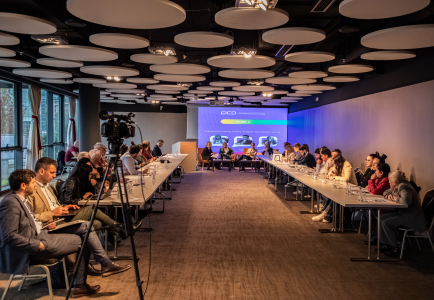Loading

The final conference of the project "Civil Society Organisations (CSO) for a more inclusive, transparent, and greener Economic Reform Program" was held today.
The general aim of this project is to empower the role and participation of Civil Society Organisations (CSOs) in shaping, implementing, monitoring, and "greening" the Economic Reform Program (ERP), with the goal of actively involving them in the reform process of Montenegro's accession to the European Union (EU).
The Economic Reform Program (ERP) for Montenegro represents the most significant national strategic document in the context of Montenegro's economic dialogue with the European Commission and EU member states.
The project "Civil Society Organizations (CSO) for a more inclusive, transparent, and greener Economic Reform Program" started its implementation in April. In the first phase of the project, a cycle of training sessions was conducted in six Montenegrin municipalities. These training sessions aimed to develop the capacities of local and national CSOs and individuals to participate in the preparation, implementation, monitoring, and "greening" of the ERP. Following this, a publication was prepared, serving as a toolkit, "The Role of CSOs in the Economic Reform Program." Additionally, a publication titled "Good Practice Examples – Economic Reform Programs in the Region" was prepared, providing an overview of the ways consultative processes are conducted within ERPs for all seven states implementing Economic Reform Programs. This highlighted the main challenges and recommendations regarding the level of stakeholder involvement in ERPs and public dialogue in reform processes.
The final conference of the project aimed to involve all interested parties: representatives of CSOs, national and local authorities, experts, business representatives, the academic community, and all interested citizens. In this way, it sought to emphasize the importance of public dialogue and consultative processes within public policies, with a focus on their impact on the creation of strategic and planning documents such as the Economic Reform Program and their influence on reform processes within European integration.
In addition to presenting the project results, the conference included two panel discussions on the topics:
(1) European Integration and Economic Reform Programs – Results and Challenges
(2) Civil Society Organizations and Economic Reform Programs.
Within the first panel, speakers included Bojana Bošković, State Secretary of the Ministry of Finance and ERP Coordinator, Tijana Stanković, an expert at the Center of Excellence in Finance (CEF), and Maja Drakić Grgur, a professor at the University of Donja Gorica.
The second panel featured discussions with Ivana Vojinović (Center for Climate Change at UDG), Biljana Gligorić (EXPEDITIO), and Radmila Bajagić (Democratic European Initiative – DEI).
Conference conclusions highlighted that this project drew attention to an extremely important document and the accompanying problem of the involvement of CSOs and other stakeholders through consultative processes. The importance of public dialogue and collaboration between the public and civil sectors was emphasized. Initiatives like these were shown to be highly desirable and necessary to strengthen the capacities and role of civil society and its representatives. Therefore, CSOs hope for continued support and implementation of similar projects in the future.
The project "CSOs for a more inclusive, transparent, and greener ERP," implemented by the Institute for Strategic Studies and Projections, is supported through the program "CSOs in Montenegro – from basic services to policy shaping – M'BASE," conducted by the Center for Civic Education (CGO), Friedrich-Ebert-Stiftung (FES), Center for the Protection and Study of Birds of Montenegro (CZIP), and Politikon Network. The project is funded by the European Union, with co-financing from the Ministry of Public Administration.
 Multimedia
Multimedia